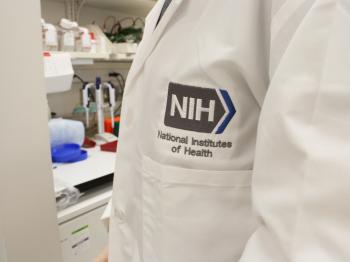In an effort to advance the care and treatment of those living with a brain or spine tumor, the Neuro-Oncology Branch and Johns Hopkins University created a joint Neuro-Oncology Fellowship Program to train the next generation of physician-scientists.
By Neuro-Oncology Branch Staff
July 23, 2021
In an effort to advance the care and treatment of those living with a brain or spine tumor, the NCI Center for Cancer Research's Neuro-Oncology Branch (NOB) and Johns Hopkins University created a joint Neuro-Oncology Fellowship Program to train the next generation of physician scientists. This fellowship program provides specialized clinical and research training, and aims to prepare physicians for successful research careers in neuro-oncology.
Mark Gilbert, M.D., NOB chief, co-directs the fellowship program with Matthias Holdhoff, M.D., Ph.D., from Johns Hopkins University. They are joined by Terri Armstrong, Ph.D., NOB deputy chief, as well as Jaishri Blakely, M.D., John Laterra, M.D., Ph.D, and Stuart Grossman, M.D., from Johns Hopkins University.
“The fellowship program was created to train physicians who have an interest in the subspeciality of neuro-oncology and are also focused on pursuing research in this field,” Dr. Gilbert says. “It is unique to have the opportunity to train at two of the top research institutions in the world. This program prides itself on individualizing the curriculum for each fellow and their career goals. We hope our graduates will be part of the next generation of leaders in the field of neuro-oncology."
The fellowship involves one year of clinical training and two years of research training in clinical, translational, or laboratory basic research. Fellows are also required to complete formal course work in pharmacology and clinical research methodology, participate in career development activities, and attend conferences. Each trainee is also embedded within the multidisciplinary research teams at NIH and Johns Hopkins University, and participates in formal rotations with neurosurgeons, medical and pediatric oncologists, neurologists, radiation therapists, and neuropathologists. In addition, fellows assist in the care and management of over 2,000 brain and spine tumor patients who come to the Neuro-Oncology Clinic each year. Trainees help to develop and implement clinical trials for adult brain and spine tumor patients, while also gaining valuable experience in data analysis and manuscript preparation.
“People who aspire to engage in research need a combined training experience," Dr. Gilbert says. "Our fellows develop expertise in clinical practice, which is mandatory for all neuro-oncologists, in addition to research experience that they can build on during their career."
2021 Neuro-Oncology Fellows
Edina Komlodi-Pasztor, M.D., Ph.D., and Sushant Puri, M.D., recently joined the Neuro-Oncology Fellowship Program. Dr. Komlodi-Pasztor became interested in oncology during her Ph.D. studies when she conducted basic research related to cancer treatment. “After my neurology training, I was looking for a fellowship training program that matched my background in both clinical work and research,” she says.
Throughout the fellowship program, Drs. Komlodi-Pasztor and Sushant Puri received strong mentorship and guidance from colleagues at both NIH and Johns Hopkins University. “I am excited about the wide range of research opportunities that the program offers and intellectual freedom to choose your area of interest,” Dr. Koblodi-Pasztor adds. “This is a unique program that incorporates two institutions: an academic hospital and a government institute. As a result, you have a perspective on these two separate models of patient care, in addition to two years of research that lay the foundation for a prolific academic career.”
"I am really excited about diving deeper into neuro-oncology and taking ownership of my patients' care," Dr. Puri says. "The training I am receiving will prepare me for my career as a physician-researcher, and I could not have asked for a better group of people around me."
